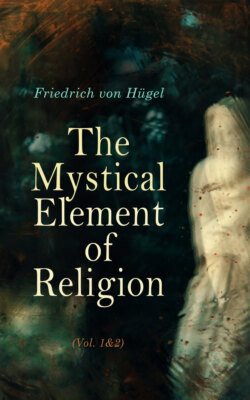Читать книгу The Mystical Element of Religion (Vol. 1&2) - Friedrich von Hügel - Страница 88
На сайте Литреса книга снята с продажи.
1. The older conception.
ОглавлениеThe first reporter,—evidently the same who, in connection with the Conversion scene, had described her soul as, there and then, at the culmination of holiness,—here says: “And although God, at the moment when,” four days before, “He had given her that love and pain, had there and then pardoned her all her sins, consuming them in the fire of His love; yet He, wishing her to satisfy the claims of justice, led her by the way of satisfaction, in such wise as to cause this special contrition, illumination, and conversion to last about fourteen months,” and it is no doubt implied by him that frequent confession was practised throughout this time.[54]
Thus we get an impressive instance of the rich and complex experience on which the Catholic doctrine is built, as to how, on the one hand, pure and perfect love ever instantly obliterates all sin; how, on the other hand, such perfect love, in those who explicitly know and accept the Church’s claims, involves a determination to confess all such grave sins as may have been committed; and how, finally, such subsequent confession is itself operative within the soul. For as between the soul and the body, so between the Mystical and Sacramental, there is a real and operative connection, though one which, however inadequately known by us, we know to be one not of simple identity or coextension.
And the experiences and doctrines here specially considered appear to require the conception of contrition and pardon as but the necessary expression and effect of true, operative love; and to demand the conclusion that purification participates in the essentially positive nature of love, its cause. The removal of bodily impurity is a negative act, and, as such, is limited and unrepeatable; but spiritual purification would thus, as something positive, be capable of indefinite increase and repetition. And hence the deep philosophical justification of repeated contrition and confession for the same sins, even though already pardoned. We shall find that such a view is also to be found in St. Catherine’s own doctrine, though there is nothing to show that the thought of this paragraph is derived from Catherine herself. I take it to proceed from Cattaneo Marabotto.
